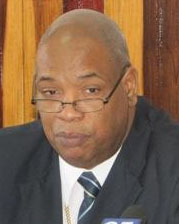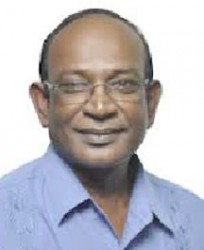Amid heckles to “name the date” for local government elections, Minister of Communities Ronald Bulkan successfully piloted a bill in the National Assembly to pave the way for the long-delayed polls but did not name a date saying this would have to be done in consultation with the Guyana Elections Commission (GECOM).
After six hours of debate and consideration of the bill in Committee, the House last night approved the Local Authorities (Elections) (Amendment) Bill 2015 after the government side successfully moved the suspension of the Standing Orders to enable the piece of legislation to go through its first, second and third readings at the same sitting.

The suspension of the Standing Orders did not meet the approval of the PPP/C and Member of Parliament Juan Edghill argued that the bill deals with a very sensitive issue and it would be a great injustice for it not to be considered thoroughly. He pointed out that 26 amendments were proposed to the principal Act and said that the time was too short for all to be considered meticulously. He said that the changes proposed requires that there be proper consultations with the people of Guyana and urged that it be sent to a Select Committee.
However, Minister of Governance Raphael Trotman said that Guyanese have been waiting 18 years for Local Government Elections and accused Edghill of delay tactics. He said that the Opposition had five days to consider the bill and has parliamentarians who are quite capable of addressing the matter. The government used its majority to approve the motion and enable debate and passage of the bill.
The bill seeks to amend 22 sections and to insert one new section in the Local Authorities (Elections) Act, Cap. 28:03. According to the Explanatory Memorandum, the amendments seek to clear the way for the holding of local government elections in December.
Clause 2 of the bill widens the definition of election officer to include Deputy Chief Election Officer, Assistant Chief Election Officer and Deputy Returning Officer. It also widens the definition of identification card to include a card issued during the continuous registration process and inserts a definition of by-election.
Vagrant

Clause 4 amends section 10(2) of the Act by stating that a vagrant is deemed not to be ordinarily resident anywhere while Clause 5 substitutes a new subsection (1) to section 11, which states that the preliminary list of voters should be extracted from the National Register of Registrants and not from the 1992 official list of electors.
Clause 7 amends section 15(1)(b) of the Act to provide that an applicant for registration as a voter shall produce a birth certificate or a valid passport while Clause 8 amends section 18(1)(b) to include the Deputy Chief Election Officer and the Assistant Chief Election Officer as persons who are authorized to enter polling stations.
Meantime, Clause 9 amends section 20(9) of the Act substituting for the Minister, the Commission, with the power to allow a Deputy Registrar to hear and determine applications for claims and objections. Clause 10 amends section 40(2) of the Act removing bankruptcy as a disqualification for election as a councillor or for continuation in the office of a councillor.
Ten clauses were amended to extend the period of time for submission of lists for nomination; examination of lists, informing of representatives of any defects; corrections to lists; application for approval of symbols and allocation of symbols; approval of lists; appeal against refusal of approval of lists; publication of lists; notice of withdrawal of candidate; application for the appointment of proxies (to be received by the returning officer not later than the tenth day before election day); and notice of cancellation of proxy (to be received by the returning officer not later than the tenth day before election day).
Proxy

Meantime, Clause 19 amends the Act by inserting a new section 53A which makes provision for a by-election of a councillor. Clause 20 amends section 62(3)(b) reducing the number of persons that a proxy can vote for from three to two. Clause 24, meanwhile, amends section 74F of the Act by substituting for subsection (3) a new subsection providing for the sorting of votes by the Elections Commission; in subsection (4) by providing for the sorting of votes; and by substituting for subsection (5) a new subsection providing for the transmission of sealed envelopes containing cast ballots to the respective returning officers for each local authority area. Clause 24 also amends section 74F of the Act by the insertion of new subsections (6), (7) and (8); subsection (6) gives the polling agents the power to verify ballots; subsection (7) provides that ballots cast are deemed to have been cast where the relevant ballot places are situated; subsection (8) provides that the votes cast will be counted by the presiding officer in each local authority area.
Clause 25 amends section 95 of the Act substituting for presiding officer the returning officer with power to effect recounts. Clause 26 amends section 101 of the Act providing that as soon as practicable but not later than five days, the returning officer shall publicly declare the results of the elections.
Thirteen amendments were proposed by PPP/C Member of Parliament Charles Ramson but only two were accepted and incorporated into the bill.
In piloting the bill, Bulkan said that there is almost universal consensus that local government elections should not be delayed. He said that there was extensive debate on the matter prior and it would be unreasonable to delay the bill. According to Bulkan, many of the amendments are not of great significance and he said that government is committed to a fresh approach. He added that the amendments were arrived at after consultations with GECOM.
Former Minister of Local Government in the PPP/C administration Ganga Persaud urged Bulkan to “brakes up” and said that a few more days to consider the bill in a select committee would not hurt. He said that government MPs would be willing to sit in a select committee during the upcoming parliamentary recess. He accused the government of adopting a posture of fast-tracking everything through the National Assembly irrespective of the nature and importance of the business and said that the bill is another example in which quality, accuracy, and best practices are placed at the sacrificial altar under the pretext of expediency.
Persaud also pointed to the new times for the application for party symbols and nomination day, among others, and questioned whether the government is serious about holding the local government polls before December 7th as they had said they would. He pointed out that the law clearly states that local government elections must be held not later that the first Monday in December.
Other PPP/C speakers also urged that the Bill be sent to a Select Committee while MP Clement Rohee urged a public education programme which he said should have been in place a long time ago.
In closing the debate, Bulkan said that the opposition comments suggest that they are not interested in the early holding of the local government polls and reiterated that the bill seeks to bridge gaps in the Principal Act.
“Too many years have passed and we are not gonna brakes up,” he said while adding that the bill is not about addressing the architecture of the framework but to address gaps and pave the way for the holding of the local government elections.
“The time for delay has ended,” Bulkan asserted. “The prevarication is over,” he declared as opposition members heckled him to “name the date.”
In response, Bulkan said that the elections would be held at the earliest practicable time and it would be irresponsible to name a date without being guided by GECOM. He said that government would not dictate to GECOM and a date would be named in consultation with the entity and that date will be early as practicable.








